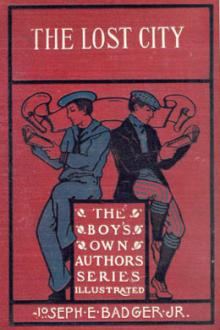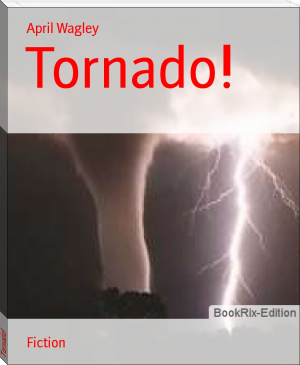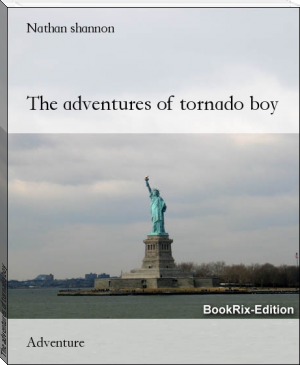The Lost City - Jr. Joseph E. Badger (children's books read aloud txt) 📗

- Author: Jr. Joseph E. Badger
- Performer: -
Book online «The Lost City - Jr. Joseph E. Badger (children's books read aloud txt) 📗». Author Jr. Joseph E. Badger
settling fast, and on all sides they could see but mighty trees,
rugged rocks, a mountain stream from whose pebbly bed came a
soothing murmur.
“Nothing so mighty much to brag of, anyway,” irreverently quoth
Waldo, after that short-lived scrutiny. “It wouldn’t fetch a
dollar an acre at auction, and for my part,—wonder when the gong
will sound for supper?”
That blunt hint was effective, and, letting the subject drop for
the time being, even the professor joined in the hurry for an
evening meal, to which one and all felt able to do full justice.
Although some rain had fallen at this point as well, no serious
difficulty was experienced in kindling a fire, while Waldo had
little trouble in heaping up a bounteous supply of fuel.
Through countless ages the forest monarchs had been shedding
their superfluous boughs, while here and there lay an entire
tree, overthrown by some unknown power, and upon which the
brothers made heavy requisition.
Professor Featherwit took from the locker a supply of tinned
goods, together with a patent coffee-pot and frying-pan, so
convenient where space is scarce and stowage-room precious.
With water from the little river, it took but a few minutes more
to scent the evening with grateful fumes, after which the
adventurous trio squatted there in the ruddy glow, eating,
sipping, chatting, now and again forced to give thanks for their
really miraculous preservation after all human hopes had been
exhausted.
Although Professor Featherwit was but little less thankful for
the wondrous leniency shown them, he could not altogether refrain
from mourning the loss of his camera, with its many snap-shots at
the tornado itself, to say nothing of what he might have secured
in addition, while riding the storm so marvellously.
More to take his thoughts away from that loss than through actual
curiosity in the subject offered by way of substitute, Bruno
asked for further light upon the so-called terra incognita.
“Of course it isn’t really an unknown land, though, uncle
Phaeton?” he added, almost apologetically. “In this age, and
upon our own continent, such a thing is among the
impossibilities.”
“Indeed? And, pray, how long since has it been that you would,
with at least equal positivity, have declared it impossible to
enter a tornado while in wildest career, yet emerge from it with
life and limb intact?”
“Yes, uncle, but—this is different, by far.”
“In one sense, yes; in another, no,” affirmed the professor, with
emphatic nod, brushing the tips of his fingers together, as he
moved back to assume a more comfortable position inside the
air-ship, then quickly preparing a pipe and tobacco for his
regular after-meal smoke.
A brief silence, then the professor spoke, clearly, distinctly:
“Washington has her great unknown land, quite as much as has the
interior of Darkest Africa, my boys, besides enjoying this
peculiar advantage: while adventurous white men have traversed
those benighted regions in every direction, even though little
permanent good may have been accomplished, this terra incognita
remains virgin in that particular sense of the word.”
“You mean, uncle?”
“That here in the Olympic region you see what is literally an
unknown, unexplored scope of country, as foreign to the foot of
mankind as it was countless ages gone by. So far as history
reads, neither white man nor red has ever ventured fairly within
these limits; a mountainous waste which rises from the level
country, within ten or fifteen miles of the Straits of San Juan
de Fuca, in the north, the Pacific Ocean in the west, Hood’s
Canal in the east, and the barren sand-hills lying to the far
south.
“This irregular range is known upon the map as the Olympics, and,
rising to the height of from six to eight thousand feet, shut in
a vast unexplored area.
“The Indians have never penetrated it, so far as can be
ascertained, for their traditions say that it is inhabited by a
very fierce tribe of warriors, before whose might and strange
weapons not one of the coast tribes can stand.”
“One of the Lost Tribes of Israel, shouldn’t wonder,” drawlingly
volunteered Waldo, stifling a yawn, and forced to rub his
inflamed eyes with a surreptitious paw.
Professor Featherwit, though plainly absorbed in his curious
theory, was yet quick to detect this evidence of weariness, and
laughed a bit, with change of both tone and manner, as he spoke
further:
“That forms but a partial introductory to my lecture, dear lads,
but perhaps it might be as well to postpone the rest for a more
propitious occasion. You have undergone sore trials, both
of—Hark!”
Some sound came to his keen ears, which the brothers failed to
catch, but as they bent their heads in listening, another noise
came, which proved startling enough, in all conscience,—a
shrill, maniacal screech, which sent cold chills running races up
each spine.
CHAPTER VI.
A BRACE OF UNWELCOME VISITORS.
Instinctively the brothers drew nearer each other, as though for
mutual protection, each one letting hand drop to belt where a
revolver was habitually carried, but which was lacking now,
thanks to the great haste with which they had taken wing at the
approach of the tornado.
“What is it? What can it mean?” asked Bruno and Waldo, almost in
the same breath, as those fierce echoes died away in the
distance.
Professor Featherwit made no immediate reply, but by the glow of
yonder camp-fire he fumbled inside the magic locker, fetching
forth firearms, then speaking in hushed tones:
“Wait. Listen for—I knew it!”
From the opposite quarter came what might easily have been an
echo of that first wild screech, only louder, longer, more
savage, if such a thing be possible.
Prepared though they now were, neither brother could refrain from
shrinking and shuddering, so hideously that cry sounded in their
ears. But their uncle spoke in cool, clear tones:
“There is nothing supernatural about that, my lads. A panther or
mountain lion, I dare say, scenting the fumes of our cookery, and
coming to claim a share.”
“Then it isn’t—Nothing spookish, uncle Phaeton?” ventured Waldo,
in slightly unsteady tones.
The professor gave swift assurance upon that point, and, rallying
as few youngsters would have done under like circumstances, the
brothers grasped the weapons supplied their hands, waiting and
watching for what was to come.
Once, twice, thrice those savage calls echoed far and wide, but
with each repetition losing a portion of their terrors; and
knowing now that prowling beasts surely were drawing nigh the
camp-fire, the flying machine was abandoned by the trio, all
drawing closer to the fire, which might prove no slight
protection against attack.
Then followed a period of utter silence, during which their eyes
roved restlessly around, striving to sight the four-footed enemy
ere an actual attack could be made.
Professor Featherwit was first to glimpse a pair of greenish eyes
in silent motion, and, giving a low hiss of warning to his
nephews, that same sound serving to check further progress on the
part of the wild beast, his short rifle came to a level, then
emitted a peculiar sound.
Only the keenest of ears could have noted that, for only the
fraction of an instant later followed a sharp explosion, the
darkness beyond being briefly lit up by a yellowish glare.
“That’s enough,—beware its mate!” cried the professor, keenly
alert for whatever might ensue; but the words were barely across
his lips when, with a vicious snarl, a furry shape came flying
through the air, knocking Featherwit over as he instinctively
ducked his head with arm flying up as additional guard.
Both man and beast came very near falling into the fire itself,
and there ensued a wild, confused scramble, out of which the
brothers singled their enemy, Waldo opening fire with a revolver,
at close range, each shot causing the lion to yell and snarl most
ferociously.
A cat-like recovery, then the fatal leap might have followed, for
the confused professor was rising to his feet again, fairly in
front of the enraged brute; but ere worse came, Waldo and Bruno
were to the rescue, one firing as rapidly as possible, his
brother driving a keen-bladed knife to the very hilt just back of
that quivering forearm.
One mad wrestle, in which both lads were overthrown, then the
gaunt and muscular brute stretched its length in a shivering
throe, dead even while it strove to slay.
Just as the professor hurried to the front, beseeching his boys
to keep out of peril if they loved him; at which Waldo laughed
outright, although never had he felt a warmer love for the same
odd-speaking, queer-acting personage than right at that moment.
“I’m all right; how’s it with you, sir? And—Bruno?”
“Without a scratch to remember it by,” promptly asserted the
elder brother, likewise regaining his feet and taking hasty
account of stock. “No fault of his, though!” giving that carcass
a kick as he spoke. “My gracious! I caught just one glimpse of
them, and I was ready to make affidavit that each fang would
measure a foot, while his claws—”
“Would pass through an elephant and clinch on the other side,”
declared Waldo, stooping far enough to lift one of those armed
paws. “But, I say, Bruno, how awfully they have shrunk, since
then!”
Whether so intended or not, this characteristic break caused a
mutual laugh, and, as there was neither sound nor sign of further
danger from like source, one and all satisfied their curiosity by
minutely inspecting the huge brute, stirring up the fire for that
purpose.
“An ugly customer, indeed, if we had given him anything like a
fair show,” gravely uttered the professor. “Only for your prompt
assistance, my dear boys, what would have become of poor me?”
“We acted on our own account, as well, please remember, uncle.
And even so, after all you have done for us since—”
“What was it you shot at, uncle Phaeton?” interrupted Waldo, who
was constitutionally averse to aught which savoured of sentiment.
“Another one of these—little squirrels, was it?”
Snatching up a blazing brand, the lad moved off in that
direction, whirling the torch around his head until it burst into
clear flame, then lowering it closer to a bloody heap of fur and
powerful limbs, to give a short ejaculation of wondering awe.
It was a headless body upon which he gazed, ragged fragments of
skin and a few splinters of bone alone remaining to tell that a
solid skull had so recently been thereon.
Professor Phaeton gave another of his peculiar little chuckles,
as he drew near, then patted the compact little rifle with which
he had wrought such extraordinary work: a weapon of his own
invention, as were the dynamite-filled shells to match.
“Although I am rather puny myself, boys, with this neat little
contrivance I could fairly well hold my own against man or
beast,” he modestly averred.
“A modern David,” gravely added Bruno, while Waldo chimed in
with:
“What a dandy Jack the Giant-killer you would have been, uncle
Phaeton, if you had only lived in the good old days! I wish—and
yet I don’t, either! Of course, it might have been jolly old
sport right then, but now,—where’d I be, to-day?”
“A day on which has happened a miracle far more marvellous than
all that has been set down in fairyland romance, my dear son,”
earnestly spoke the professor. “And when the astounding truth
shall have been published, broadcast, throughout all Christendom,
what praises—”
“How thoroughly we shall be branded liars, and falsificationers
from ‘way up the crick’!” exploded the youngster, making a wry
grimace and moving on





Comments (0)